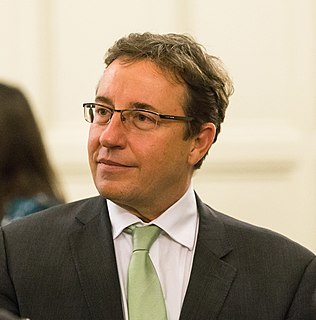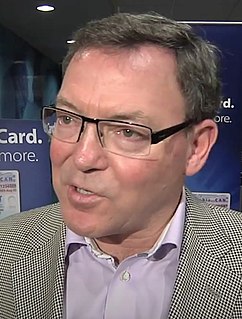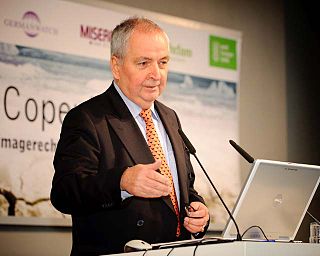A Quote by Barry Gardiner
Climate change is real and anthropogenic; and the 5th Assessment Report of the IPCC has left the deniers little room for manoeuvre, but they are swiftly morphing into a new breed that accept the climate is changing but like to suggest this may have positive benefits.
Related Quotes
Despite the international scientific community's consensus on climate change, a small number of critics continue to deny that climate change exists or that humans are causing it. Widely known as climate change "skeptics" or "deniers," these individuals are generally not climate scientists and do not debate the science with the climate scientists.
With Climate Change as a Security Risk, WBGU has compiled a flagship report on an issue that quite rightly is rising rapidly up the international political agenda. The authors pull no punches on the likelihood of increasing tensions and conflicts in a climatically constrained world and spotlight places where possible conflicts may flare up in the 21st century unless climate change is checked. The report makes it clear that climate policy is preventative security policy.
Every climate scientist has his or her own views on some issues that differ from the mainstream in detail. But the broad findings of the IPCC (Intergovernmental Panel on Climate Change) have general support amongst scientists with relevant specialist expertise. The broad wisdom of the IPCC is strongly contested by a small number, and a small minority, of reputed climate scientists. It is not contested by the large majority of specialists, and by the leaders of the relevant learned academies in the countries of great scientific accomplishment.
...the world needs to face up to the challenge of climate change, and to do so now. It is clear that climate change poses an urgent challenge, not only a challenge that threatens the environment but also international peace and security, prosperity and development. And as the Stern report showed, the economic effects of climate change on this scale cannot be ignored, but the costs can be limited if we act early
The IPCC (Intergovernmental Panel on Climate Change, a group of more than 2,500 scientists) has provided the world community with first class assessments of the soaring temperatures the world is facing, the devastating impacts of these rises and the ways in which we can try and avoid the worst effects of global warming. We now know climate change is real and the hand of humankind in this warming is becoming clearer and clearer.
You might want to check with the IPCC Bureau. I've been told that IPCC is above national FOI Acts. One way to cover yourself and all those working in AR5 [the upcoming IPCC Fifth Assessment Report] would be to delete all e-mails at the end of the process. Hard to do, as not everybody will remember it.
It's very hard to track down what's real and what's not real. We haven't absorbed what climate change is doing. Because whether people associate it or not, fear of immigration is completely related to climate change, because the mass migrations that are happening, the war in Syria, all of these structural human migrations are related to climate change.
Sensible policies on global warming should weight the costs of slowing climate change against the benefits of slower climate change. Ironically, recent policy initiatives, such as the Kyoto Protocol of 1997, have been introduced without any attempt to link the emissions controls with the benefits of the lower emissions.
I don't believe that climate-change fiction will change the mind of a denier because most of the deniers I've met are basically in a cult situation. It's a faith issue. It's not a rational issue. There's no fact that's going to change their mind. They simply believe in the cult of climate-change denial and it somehow feeds into the rest of the mythos of their own life story.

































